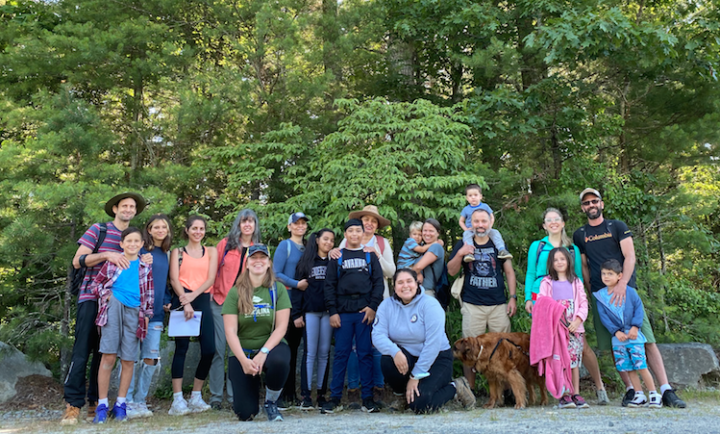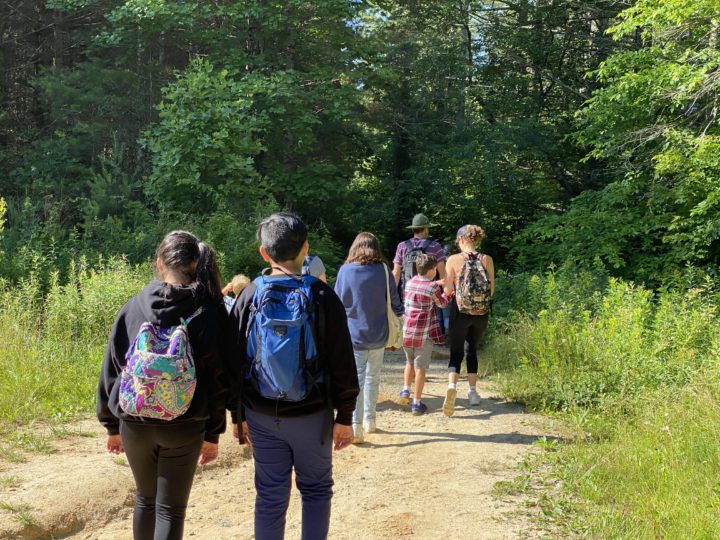BY ALEXLA PÉREZ SÁNCHEZ
When I was a child, anything to do with the outdoors was a mystery to me.
I was always interested in learning more and spending time outside. Yet on the first occasion that my mother, siblings and I ventured into the woods for a hike, we made it to the trailhead at the Carl Sandburg Home and then quickly turned back. All of the signage was in English, and we could not understand any of the information that would help guide us on our adventure. A couple of years later, we went back to try again, and this time we made it farther than the trailhead. We made it about one-fourth of a mile, and then we turned around. We faced two obstacles: my mother’s fear and fatigue.
Yes, we had made it farther than before, but this time she was too tired from working many jobs and too scared from her lack of outdoor knowledge to take my siblings and me into the woods safely. The silence walking back to the car was filled with many emotions. In my case, I filled that quarter-mile with frustration, confusion and hopelessness about ever going outside again. My mentality at the time couldn’t comprehend my mother’s wariness or fatigue. After all, I spent all day at school and playing around our house — and I was fine! Full of energy, in fact!
Not so surprisingly, as I got older, that energy was more difficult to retain, but along with that, I began to realize what had happened to us. My mother’s caution made sense. After all, most would not take on a new and potentially dangerous challenge and then bring along their 13-, 8- and 6-year-old kids without a second thought. In high school, I learned that similar situations had happened in my friends’ families. They, too, were forced to turn back because of a lack of knowledge and confidence about the outdoors.
This year, more than a decade later, I was given the opportunity to shake some change into the Spanish-speaking community by improving participation in the outdoors and the sense of inclusion we are shown there. This internship was based in Conserving Carolina, a WNC conservation nonprofit, and was funded by Dale Weiler and Loti Woods of Tryon. The goals were to expand community outreach and engage more people as partners and ambassadors, with impacts extending well beyond this internship’s span. And on a timeline of 19 weeks, I hit the ground running. There was absolutely no time to lose.

New adventures, new moments
In the first few weeks, we set the foundation for the Nuevas Aventuras, Nuevos Momentos bilingual hike series. I came up with the name (which translates to New Adventures, New Moments) because of the experience I hoped people would have as first-time hikers and outdoor adventurers. The series consisted of one hike per month, June-September. The outings were meant to be at an introductory level and include outdoor/environment educational opportunities to grow and develop.
Our first hike was to Wintergreen Falls in DuPont State Forest, where we learned about trail etiquette and safety. At The Park at Flat Rock, we participated in a plant scavenger hunt for nonnative invasive species. Our third hike, at the Brevard Greenway, focused on bird-watching, and we successfully identified 35 species of birds, thanks to our wonderful volunteers. But alas, not all great things are perfect. Our fourth hike — meant for the Vaughn Creek Greenway — was canceled due to a shortage of participants.
The conversations that arose allowed us to step out of our comfort zones and take in different perspectives. It turns out that fear and weariness were not the only reasons for the lack of participation from many Spanish speakers in the outdoors. There were transportation issues, work interferences and a misunderstanding of what someone should wear or own to “properly” go on a hike. And in case anyone needs to hear this: There is no dress code for hiking. Well, to an extent, of course. But I mean that most participants were under the impression that they could not go hiking unless they had the most expensive hiking boots or the most popular trekking poles. Folks, for most introductory hikes, a pair of closed-toed shoes and a filled-up water bottle will do just fine. Everything else can be bought to preference later on.

New methods were learned. Confidence was built. Strangers became friends. And in the time of a pandemic that requires social distancing and isolation, all of these new skills and moments seemed like a breath of fresh air! (Pun intended.) But even more importantly, my Spanish-speaking community finally felt actively welcomed in the outdoors! The progress made through this program was incredible and much needed, but the work is only beginning.
I say to the individuals reading this article: Go outside today and do something that brings you joy and strength! And while you’re at it, take someone with you! Help them. Encourage them. Grow with them. As my friend Tony Beurskens once taught me, “Put yourself in a place of discomfort for the sake of growth” and remember that “there is beauty in our differences and comfort where they overlap.”
Nature deserves our respect, love and acknowledgment. Our community also needs these things, and being a part of a community comes with both good and bad. But it is the responsibility of us all to make sure that the bad becomes good and the good keeps its course.
More to be done
In addition to the hike series this summer, I translated eight trails’ pages on Conserving Carolina’s website, along with all of its trailhead signage. I also created videos that would educate our community — of all demographics — about conservation, wildlife and ecology, and give Spanish-speaking community members a voice regarding their experience and connection with nature. I also have helped with the beginning of a new project, Las Flores, that we hope to convert into a Hispanic and Latine community center where individuals can continue to learn more about the environment and find comfort in nature.
As I reflect on my internship experience, I recognize that if Dale and Loti hadn’t invested in this internship, I would not be where I am now. If my supervisors, Rose Jenkins Lane and Ericka Berg, hadn’t given me the support, motivation and love that got me through the challenges of this internship, I would not be where I am now. If Conserving Carolina had not listened to my struggles and supported me throughout the internship, I would not be where I am now.
A series of events unfolded for me, and I gave it my all to make sure that there would not be another family that turns back a quarter-mile into a trail, all because they could not understand the signage or felt unknowledgeable about what awaits them.

And although I did a lot, I believe that there is still much more to be done. At 20 years old, I have fought for my community and for people to have a voice, but I am far from stopping now. This internship taught me many things, but one of the most important lessons has been that there will always be people who want to help you help others. So, I expect that more members in the community will strive to assist others and give it their all. Remember, your community has your back.
Alexla Pérez Sánchez is a senior at UNC Asheville, where she is majoring in political science, and will be earning her master’s in human rights at the University of Essex in the coming year.




Before you comment
The comments section is here to provide a platform for civil dialogue on the issues we face together as a local community. Xpress is committed to offering this platform for all voices, but when the tone of the discussion gets nasty or strays off topic, we believe many people choose not to participate. Xpress editors are determined to moderate comments to ensure a constructive interchange is maintained. All comments judged not to be in keeping with the spirit of civil discourse will be removed and repeat violators will be banned. See here for our terms of service. Thank you for being part of this effort to promote respectful discussion.